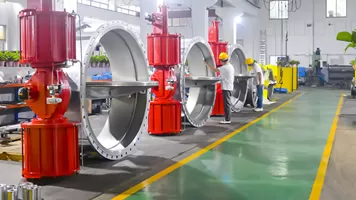Introduction
In the intricate realm of fluid control systems, valves serve as indispensable control elements, tasked with regulating, shutting off, and diverting fluids. Among them, the plug valve stands out with its unique design, exceptional sealing capabilities, and convenient operation, finding wide applications across industries such as oil, chemicals, natural gas, and water treatment.
Working Principles and Classifications of Plug Valves
A plug valve operates by rotating a plug around the valve body’s centerline, typically 90 degrees, to align or misalign the passage openings on the plug and valve body, thereby controlling the flow of fluids. Depending on the sealing method, plug valves can be classified into four main types: tight-seating, packed, self-sealing, and oil-sealed.
- Tight-seating Plug Valves: Rely solely on the fit between the plug and valve body for sealing, achieved by tightening a nut at the bottom.
- Packed Plug Valves: Utilize packing material to achieve sealing between the plug and valve body, offering superior sealing performance and reduced leakage paths.
- Self-sealing Plug Valves: Employ the pressure of the medium itself to press the plug upwards, ensuring sealing, particularly suitable for air media.
- Oil-sealed Plug Valves: An innovative type that relies on forced lubrication to create an oil film between the plug and valve body, enhancing sealing, reducing operating resistance, and extending service life.
Performance Advantages of Plug Valves
Plug valves occupy a pivotal position among valves due to their distinctive advantages:
- Rapid and Effortless Opening and Closing: A mere 90-degree rotation achieves full opening or closing, ideal for frequent operation scenarios.
- Low Fluid Resistance: Offering a resistance coefficient comparable to that of a similarly long pipe section, plug valves minimize system energy consumption.
- Excellent Sealing Performance: When fully open or closed, the sealing surfaces of the plug and valve body are isolated from the medium, protecting them from erosion by high-speed fluids, particularly suitable for media containing solid particles.
- Simple Structure and Easy Maintenance: The straightforward design facilitates easy processing, low maintenance costs, and convenient repairs.
- Multi-channel Design: Readily adaptable to multi-channel configurations, a single plug valve can replace multiple valves, simplifying piping systems and reducing costs.
Applications and Optimization of Plug Valves in Fluid Control
Plug valves are extensively used in fluid control systems, particularly where rapid opening/closing, low leakage, and high sealing performance are crucial. For instance, in oil and gas transmission pipelines, plug valves are the preferred choice due to their exceptional sealing and high-pressure capabilities. They also play vital roles in water treatment and chemical reactors.
To further optimize plug valve performance and enhance their fluid control capabilities, the following aspects can be addressed:
- Material Optimization: Adopt more corrosion-resistant and wear-resistant materials, such as stainless steel and duplex stainless steel, to improve durability and reliability.
- Sealing Surface Treatment: Apply special treatments to the sealing surfaces, like chrome plating or ceramic coating, to enhance hardness, wear resistance, and prolong service life.
- Lubrication System Improvement: Build upon the oil-sealed design by refining the lubrication system to ensure stability and durability of the oil film, reducing operating resistance and wear.
- Intelligent Transformation: Integrate smart control technologies, like electric actuators and remote monitoring systems, to enable remote control and intelligent management of plug valves, enhancing system automation and operational efficiency.
As an essential component of fluid control systems, plug valves excel with their unique design, superior sealing capabilities, and user-friendly operation, finding widespread applications across industries. With technological advancements and industrial development, plug valve performance will continue to improve, providing more reliable support for the stable operation and efficient management of fluid control systems. In the future, the intelligent transformation of plug valves will become a significant trend, injecting new vitality into the development of the fluid control industry.

